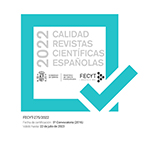O libro da filla or the Promise of (Un)Happiness according to Inma López Silva
Abstract
The aim of this article is to analyse the representation of performative (un) happiness, with its mandates, promises, taboos and failures as codified in O Libro da Filla (2020), the last novel of the Galician writer Inma López Silva. Parting from the critical theory of emotions elaborated by Sara Ahmed in The promise of happiness (2010), I will see how the protagonists in the analysed text associate happiness with certain social roles, places, rituals or lifestyles, or even with certain ways of comprehending and experiencing the world. The above “happy objects” are imposed on them by the dominant cultural logic as guarantors of the “good life” and “scripts” of normative conduct. Likewise, we I will verify how and to what social extent the promotion of happy regulations conceals the “the psychic life of power” and causes the emergence of melancholy. Finally, the analysis of O Libro da Filla should reveal the political potential that lies in the archives of unhappiness and in the act of writing.
Downloads
Article download
License
In order to support the global exchange of knowledge, the journal Madrygal. Revista de Estudios Gallegos is allowing unrestricted access to its content as from its publication in this electronic edition, and as such it is an open-access journal. The originals published in this journal are the property of the Complutense University of Madrid and any reproduction thereof in full or in part must cite the source. All content is distributed under a Creative Commons Attribution 4.0 use and distribution licence (CC BY 4.0). This circumstance must be expressly stated in these terms where necessary. You can view the summary and the complete legal text of the licence.








